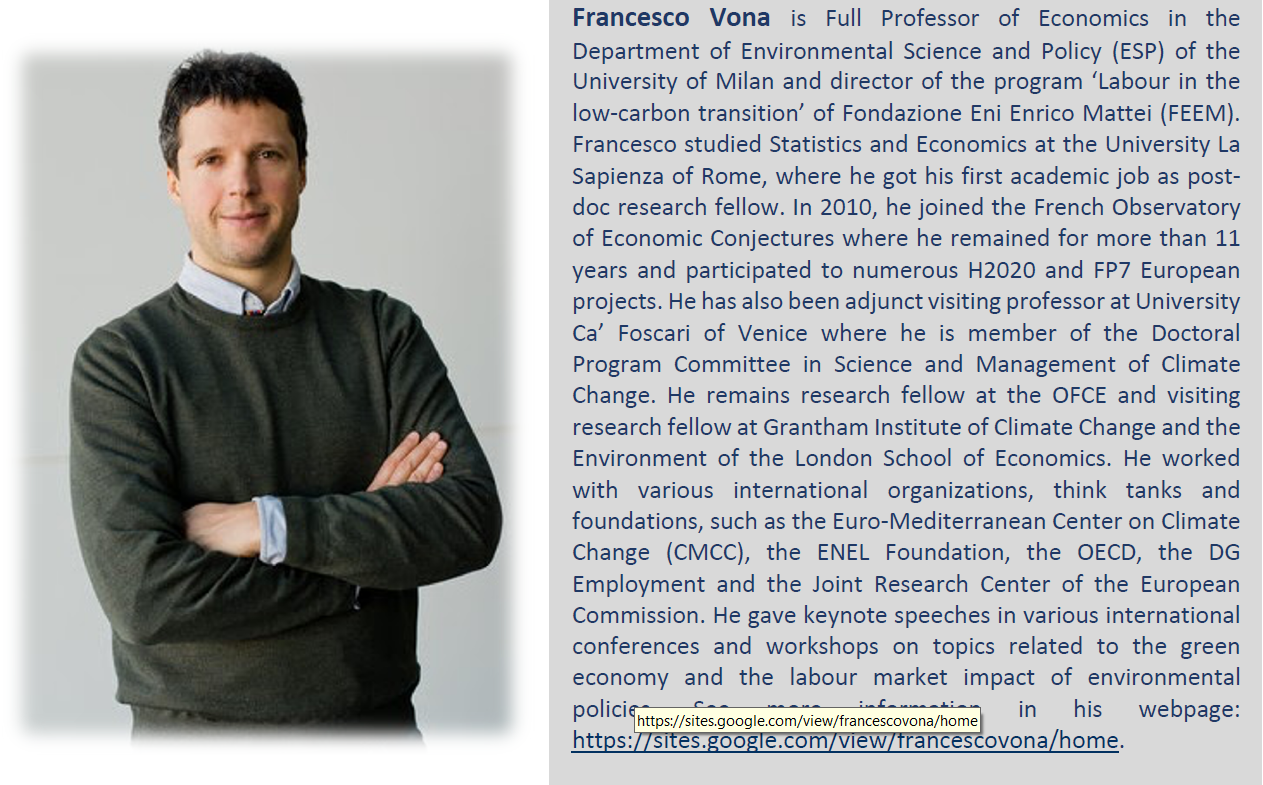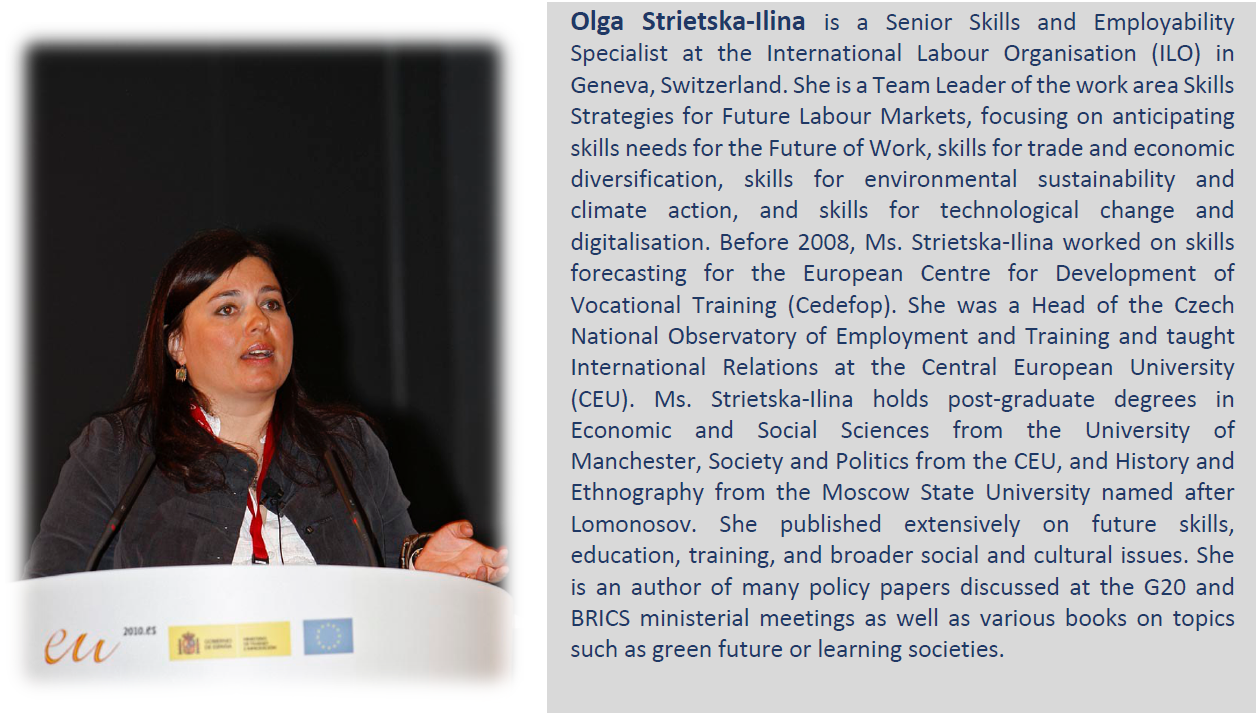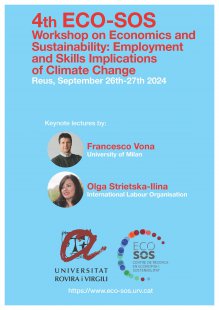4th ECO-SOS Workshop on Economics and Sustainability, 26-27 September 2024
From to
Aula Magna. Faculty of Business and Economics
Extended deadline 31 May
4th ECO-SOS Workshop on Economics and Sustainability:
Employement and Skills Implications of climate change and the green transition
Reus, September 26th-27th 2024
The Research Centre on Economics and Sustainability (ECO-SOS) is a research centre created in 2010 as CREIP (Research Centre in Industrial and Public Economics), that recently moved to sustainability issues, in line with research interests of its members. Specifically, ECO-SOS studies the connection between sustainability and the following areas of interest: environmental and climate economics, health economics, regional and urban economics, education and labor market business and innovation, energy and natural resources, industrial organization, economic policy, game theory and environmental conflicts, and transport and tourism.
Workshop objectives
The urgent need for the decarbonisation of the world economy to mitigate climate change is one of the greatest challenges facing today's society. Changes in ourbehaviour and in our consumption and production patterns are needed. Transition to a greener economy and society will require actions on many fronts. Indeed, we have seen increased green structural changes associated with the application of new green technologies and regulations on the one hand, and expanded demand and need for retraining for employment and to meet new market opportunities on the other hand. While advances are happening, there is a growing concern on whether we are acting fast enough.
According to the OECD, we need to measure better whether the countries' workforce possess the green skills needed to support the widespread diffusion of climate-friendly technologies, and whether education systems are fit for purpose to advance the green transition. At the same time, considering the rigidities that characterize education and TVET systems, the continued progress of climate goals will also depend on improving the allocation (reallocation) of the existing stock of human talent at different levels: individual skill transitions; sector employment transitions; and regional/country migration patterns.
To stimulate research and discussion on the employment and skill requirements of thegreen transition we seek empirical and theoretical papers on three interrelated areas:
- Changes in occupations, skills gaps and skills shortages in meeting the skillsdemand of the green transition. If we want to deal with climate change, what kinds of radical changes should we expect in occupations and businesses? How will these changes affect workers' careers and company practices, employment structures and work organization, work routines and training? What is the scale of the need for reskilling and upskilling to realize the employment potential?
- How labour migration supports green skills development and helps fill labour shortages. How labor migration, grounded in the human and labor rights of migrants and the principle of gender-equality, can serve as an adaptive response to foster green growth? Is there a need to establish a specific migration strategy for people facing the adverse impacts of disasters, climatechange and environmental degradation?
- Regions as mesostructures to estimulate the transition to greener economies. Can regions be a key actor in planning, and coordinating skills and environmental policy matters and between public and private sectors?
Keynote Speakers: Prof. francesco Vona and Ms. Olga Strieska-Ilina (TBC)


Extended deadline for Submission of papers
Full papers should be submitted (in pdf format) to eco-sos@urv.cat by May 31st 2024. Authors are allowed to submit only one paper. Information about acceptance will be communicated by June 30th 2024. All paper presenters are expected to discuss another paper during the workshop. The assignment of discussants will be distributed to participants by the end of July.
As this workshop intends to create a network among researchers working on sustainability issues, participation without paper presentation is also encouraged. In this case, please send us an e-mail indicating your interest in attending the workshop (before the end of August, for the sake organizing).
Registration and fees
There is a non-refundable fee for all the attendants of EUR 170€. The fee covers coffee breaks, a lunch and a gala dinner, and full access of all activities of the workshop.
Scientific Committee
Francesco Vona (University of Milan)
Davide Consoli (INGENIO, CSIC-UPV)
Josep-Maria Arauzo-Carod (ECO-SOS, Universitat Rovira i Virgili)
Ferran Mañé (ECO-SOS, Universitat Rovira i Virgili)
Local Organising Committee
Josep-Maria Arauzo-Carod (ECO-SOS, Universitat Rovira i Virgili)
Cori Vilella-Bach (ECO-SOS, Universitat Rovira i Virgili)
Eulàlia Torner (ECO-SOS, Universitat Rovira i Virgili): eco-sos@urv.cat

